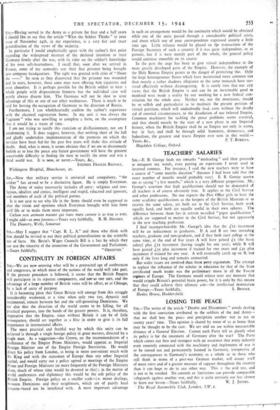TEACHERS' SALARIES
SIR,—E. B. George finds my remarks "misleading" and then proceeds to misquote my words, even putting an expression I never used in inverted commas. For instance, I said the new teachers were to have a course of "some months duration" (because I had been told that the exact number of months would probably vary). E. B. George quotes me as saying "a few months," which is a very different proposition. Mr., George's assertion that high qualifications should not be demanded of all teachers is of course obviously true. It applies to the Civil Service and other professions. No one expects the Post Office girls to have the same academic qualifications as the keepers of the' British Museum or to receive the same salary, yet both are in the Civil Service, both work equally hard, and both are equally useful in their own spheres. The difference between them lies-in certain so-called "paper qualifications" which are supposed to matter in the Civil Service, but not apparently in the new teaching profession.
I find incomprehensible Mr. George's idea that the Era increment will be an inducement to graduates. If A and B are two intending teachers, graduate and non-graduate, and if they both start college at the same time, at the end of five years A will have gained Lx (the basic salary) plui £12 increment (having taught for one year), while B will have gained L3x plus increment if trained for two years and £4x plus increment if trained for one year. A will eventually catch up on B, but only if she lives long and remains unmarried.
But wider issues are involved than these petty arguments. The attempt to replace the influence of the scholar in education by that of the State certificated youth leader was the preliminary move in all thc Fascist regimes of Europe. The Germans would rejoice over any measure that would cripple Britain's potential brain power, for it is only by this means that they could achieve their ultimate aim—the intellectual domination


























 Previous page
Previous page